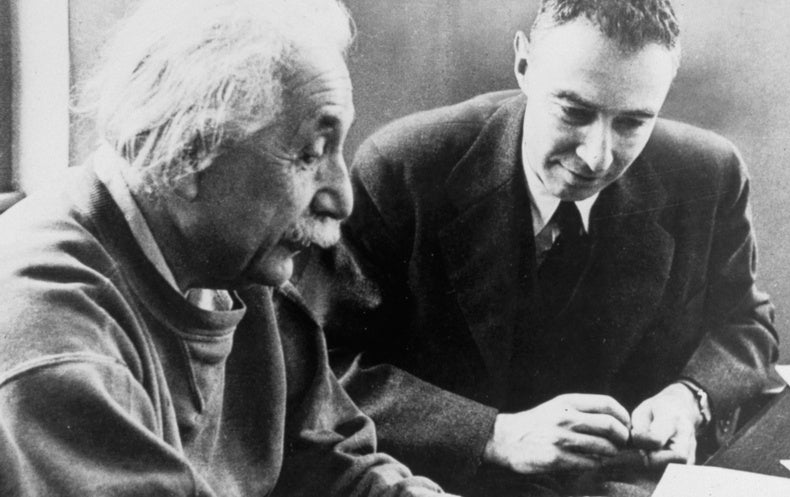J. Robert Oppenheimer, now the protagonist of a much-anticipated film hitting theaters on July 21, is today most known for his scientific leadership of the U.S. Manhattan Project, the World War II–era crash program to build the first-ever atomic bombs. But just a few years earlier, Oppenheimer had found himself pondering very different “weapons” of mass destruction: black holes—although it would be decades before that name arose.
“It was influential; it was visionary,” says Feryal Özel, an astrophysicist at the Georgia Institute of Technology, of Oppenheimer’s work on black holes and neutron stars, the superdense corpses of expired massive stars. “He has a lasting impact.” Özel is a founding member of the Event Horizon Telescope Collaboration, which released the first-ever image of a black hole in 2019—80 years after Oppenheimer co-authored a paper theorizing that such objects could exist.
Özel isn’t the only leading modern physicist to admire Oppenheimer’s work on black holes. “It stands up completely; there are no flaws,” says Kip Thorne, an emeritus professor of physics at the California Institute of Technology. Thorne won the Nobel Prize in Physics in 2017 for his work with the Laser Interferometer Gravitational-Wave Observatory (LIGO), which in 2015 detected gravitational waves from two colliding black holes. “It went so far beyond anything that anybody else had ever done,” Thorne says of Oppenheimer’s “tour de force” paper exploring black holes, which runs only five pages long. “It is amazing what is contained there.”
Oppenheimer’s brief foray into astrophysics began with a 1938 paper about neutron stars, which continued in a 1939 installment that further incorporated the principles of Einstein’s general theory of relativity. He then published a third paper on black holes on September 1, 1939—but at the time, it was scarcely noticed because this was the very day Germany invaded Poland, launching World War II. Oppenheimer never wrote on the topic again.
Even if it hadn’t been overshadowed by war, Oppenheimer’s work on neutron stars and black holes “was not understood to be terribly significant at the time,” says Cathryn Carson, a historian of science at the University of California, Berkeley.
Each paper was written with a different member of the swarm of graduate students and postdoctoral scholars that Oppenheimer carefully cultivated. These protégés facilitated his ability to jump between research topics—and ultimately, according to Thorne and others, represent one of his most important contributions to physics.
Oppenheimer’s climactic third paper, written with his student Hartland Snyder, explores the implications of general relativity on the universe’s most massive stars. Although the physicists needed to include some assumptions to simplify the question, they determined that a large enough star would gravitationally collapse indefinitely—and within a finite amount of time, meaning that the objects we now know as black holes could exist.
“Eventually there should emerge what we would now call a singularity at the origin, a point of infinite density where, in some sense, spacetime itself rips, and there should become what we would now call an event horizon,” says David Kaiser, a physicist and historian of science at the Massachusetts Institute of Technology. “This is all in that paper—not in the modern vocabulary, but the mathematics is absolutely recognizable to us today.”
In the decades since Oppenheimer and Snyder’s black hole bombshell, scientists have confirmed that the same principles hold even without the simplifying assumptions initially put in place. Thorne says that the paper is particularly staggering, given contemporary work from an even more famous physicist—the one who developed general relativity in the first place.
“[Albert] Einstein published almost simultaneously a paper in which he argued that you cannot have a star or any object shrink to the size of what we now call the gravitational radius or the size of a black hole,” Thorne says. “Einstein was completely wrong.”
But despite the merit of Oppenheimer and Snyder’s work on black holes, the topic simmered on physicists’ back burner for decades—and today is perhaps best known as a sobering example of how brilliant ideas can be overlooked, says Manuel Ortega-Rodríguez, a theoretical physicist at the University of Costa Rica.
“It struck me as really, really interesting and fascinating and scary that such an idea was there for like 25 years, and nobody paid attention,” he says. “That means that today we could have an equally revolutionary idea right now that the community is ignoring.”

